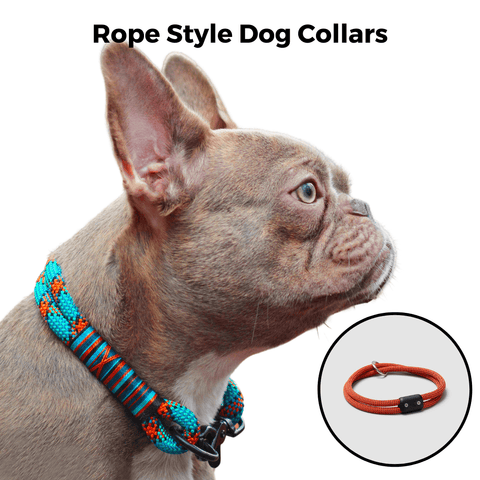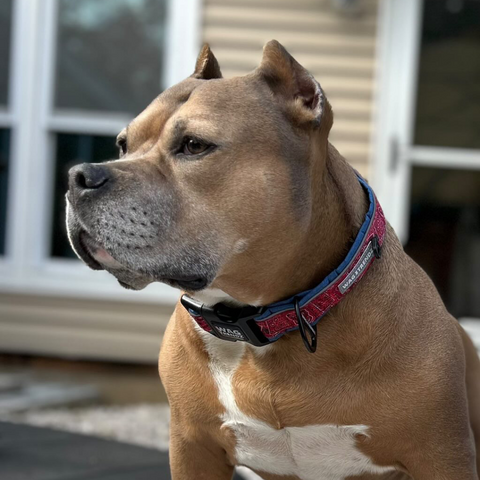When it comes to selecting the perfect collar for your furry friend, the myriad of options can be overwhelming. However, understanding the specific features, benefits, and drawbacks of each type can greatly simplify the process. The Wag Trendz® team highly recommends nylon or reflective nylon collars as the best overall choice for their comfort, versatility, breathability, hypoallergenic properties, and safety aspects
Wider Dog Collars: A Safer Option
Regardless of the type, wider collars have been scientifically proven to be safer and more comfortable for dogs as they distribute pressure more evenly around the neck. They're especially recommended for dogs prone to tracheal collapse (most breeds) or those with respiratory issues (short-nose breeds aka brachycephalic dogs).
Dog Collar Safety Tips
Always ensure collars carry identification, never leave your dog unsupervised with a collar on, and use no-pull harnesses for training and walking dogs that pull or have specific breed vulnerabilities.
The article delves into the details of six different types of dog collars, comparing and contrasting their features, benefits, and drawbacks
Nylon and Reflective Nylon Dog Collars
Combining the durability and ease of nylon with the safety of reflective material, these collars are versatile, comfortable, and provide increased visibility for nighttime walks. They are adjustable, come in various colors and patterns, and are hypoallergenic, making them suitable for dogs with sensitive skin. While they may wear over time, their overall benefits outweigh the cons and make them a top recommendation from the Wag Trendz® team.
Pros:
-
Comfort: Both nylon and reflective nylon collars are known for their comfort, ensuring that your dog can wear them for extended periods without irritation.
-
Versatility: Suitable for a wide range of activities, from casual walks to more adventurous outings.
-
Breathability: These collars allow air to circulate, preventing excessive sweating and discomfort around the neck area.
-
Hypoallergenic: Ideal for dogs with sensitive skin, as nylon is less likely to cause allergic reactions.
-
Visibility and Safety: Reflective nylon collars enhance your dog's visibility during nighttime walks or in low-light conditions, adding an extra layer of safety.
-
Durability and Easy Maintenance: Both nylon and reflective nylon are durable materials that are easy to clean and maintain - can be washed on delicate in a garment bag or pillow case and laid flat to dry.
-
Adjustability: These collars can be easily adjusted to fit your dog perfectly, ensuring a snug yet comfortable fit.
-
Wide Range of Options: Available in various colors, patterns, and sizes, allowing you to choose a collar that best fits your dog's personality and size.
Cons:
-
Chewing Risk: Dogs prone to chewing may damage nylon collars.
-
Moisture Absorption: While they dry quickly, nylon collars can absorb moisture, which might be uncomfortable in wet conditions.
-
Wear Over Time: The reflective material may wear or peel off over time, and the nylon might lose its color or fray.
Wag Trendz® offers wide nylon collars and even wider reflective nylon dog collars.

Rope Style Dog Collars
Rope style collars offer strength and control as they are typically made from durable climbing rope. They're known for their unique aesthetic appeal but might be less comfortable and harder to adjust than other types.
Pros:
-
Artisanal Quality: Often handcrafted, offering a unique and distinctive aesthetic appeal.
-
Heavy-Duty: Built to be strong and durable, ideal for stronger dogs that require a sturdy collar.
-
Natural Materials: Many are made from eco-friendly, natural fibers, making them an environmentally conscious choice.
-
Beneficial for Long Hair: Helps prevent hair from becoming matted and tangled, particularly advantageous for dogs with longer coats.
Cons:
-
Rigidity: These collars can be quite stiff, potentially causing discomfort, especially when first worn.
-
Maintenance: Requires more effort to keep clean and maintain compared to other types of collars.
-
Heavier: The robust construction can make these collars heavier, which might not be suitable for all dogs, especially smaller or more sensitive breeds.
-
Potential Noose Effect: Rope style collars can tighten if the dog pulls, acting like a noose. They should be used to carry identification but are not recommended for walking your dog, especially for those that pull or are easily excited.
While rope style dog collars offer aesthetic appeal and durability, it's crucial to weigh these benefits against the potential cons for your dog's safety and comfort. They are best used for identification purposes and not as a primary means of control during walks. For walking and training, consider safer alternatives like harnesses or other types of collars recommended by professionals. Always prioritize your dog's well-being and comfort when choosing any collar or walking aid.

Martingale Dog Collars
Martingale Dog Collars provide a safer alternative to choke collars, tightening when the dog pulls but not to the extent of causing harm. They're good for training and dogs that tend to slip out of their collars (such as Greyhounds and Whippets), though they require proper fitting, training on proper use and aren't suitable for all breeds.
Pros:
- Adjustable Tension: Tightens when the dog pulls but stays comfortably loose when not pulling.
- Wide Application: Good for a variety of breeds, especially those with narrow heads.
- Training Efficiency: Excellent for teaching dogs not to pull without harsh methods.
Cons:
- Supervision Required: Should not be left on a dog when unsupervised due to the tightening aspect.
- Potential Over-Correction: If not used properly, can frighten or harm the dog.
- Complex Fitting: Requires accurate fitting to be effective and safe.
- Breed Specific: Only recommended for certain breeds.

Choke Style Dog Collars
Wag Trendz® strongly advises against the use of choke style dog collars under any circumstances. These collars, which are often used with the intention of training and controlling dogs, can pose serious risks to your pet's well-being and are not suitable for novice dog owners or any caring pet parent.
The Dangers of Choke Style Dog Collars:
-
High Risk of Injury: Choke collars exert excessive pressure on the dog's neck, leading to potential tracheal collapse, respiratory distress, or even more severe injuries. The risks are particularly high for breeds predisposed to breathing conditions.
-
Negative Training Experience: Training with pain and discomfort can lead to a negative association with the learning process, potentially causing long-term psychological harm.
-
Skill Dependency: Even in the hands of professionals, these collars can be unpredictable and unsafe. For the average pet owner, the risks far outweigh any perceived benefits.
Why They Are Discouraged:
-
Inhumane Method: Leading a dog by the neck with an instrument designed to cause discomfort is an inhumane training method. Consider how it would feel to be controlled by something that inflicts pain.
-
Permanent Damage Potential: The force applied by choke collars can cause permanent injuries or even death, especially in dogs with tracheal or respiratory issues.
-
Better Alternatives Available: There are many humane and effective training methods and tools available, such as heavy-duty no-pull dog harnesses. These alternatives provide a safe way to train your dog to walk politely on a leash without risking their health or creating a fearful environment.
Wag Trendz® Recommendation: As a responsible pet owner, it's crucial to consider the physical and emotional well-being of your dog. Wag Trendz® recommends exploring safer, more compassionate training tools. A heavy-duty no-pull dog harness is an excellent alternative that can help train your dog effectively without the risks associated with choke collars. Such harnesses distribute pressure evenly and provide you with control without causing pain or discomfort to your beloved pet.

Tactical Dog Collars with Handles
Designed for working dogs, these collars are typically extremely durable and feature handles for quick control. They're typically heavier and more expensive, making them overkill for the average pet owner.
Pros:
- Enhanced Handling: The handle provides instant control in critical situations.
- Built to Last: Designed to withstand rigorous use and environments.
- Extra Features: Often come with additional features like D-rings and ID panels.
Cons:
- Bulky: Can be too heavy and rigid for small or sensitive dogs.
- Overwhelming: May be too much for everyday, casual use.
- Price: Typically more expensive due to their specialized design and durability.

Waterproof Dog Collars
Perfect for dogs who love the water, these collars resist moisture and odors and are easy to clean. They might be stiffer and more expensive but are great for active dogs in humid environments.
Pros:
-
Moisture Resistant: Ideal for dogs who frequently get wet, preventing the collar from becoming soggy and uncomfortable.
-
Durability: Often made from materials that resist wear from water, sun, and active play, making them last longer.
-
Easy to Clean: Simple to rinse off and wipe down, keeping your dog's collar smelling fresh and looking clean.
-
Odor Resistant: Materials used in waterproof collars typically don’t absorb smells, keeping the "wet dog" smell at bay.
-
Non-Absorbent: Doesn't soak up water or other liquids, which can prevent skin irritation and chafing around the neck.
-
Variety of Styles: Available in various colors and designs to suit your dog’s personality and your aesthetic preferences.
Cons:
-
Safety: May stretch or loosen easily and allow dogs to slip out.
-
Comfort: Some waterproof materials might be stiffer or less breathable than fabric, which could be less comfortable for some dogs.
-
Limited Flexibility: May not offer as much flexibility or softness as nylon or fabric collars, which could affect the fit.
-
Cost: Might be more expensive than traditional nylon or fabric collars due to the specialized materials used.
-
Aesthetic Wear: Although durable, the appearance might degrade over time, especially in cheaper models.
-
Heavier: Some can be heavier than traditional collars, which might not be suitable for smaller or more sensitive breeds.
-
Irritation & Hair Loss: May rub or irritate dogs who have sensitive skin or may cause hair to fall out.

Conclusion
In choosing the right collar, comfort, safety, and suitability to your dog's lifestyle should be your guiding principles. In other words, it's crucial to consider your pet's specific needs, behavior, and comfort, as well as your own handling skills and lifestyle. Wag Trendz® recommends nylon or reflective nylon collars for their blend of safety, comfort, and versatility, making them an ideal choice for most dogs and puppies. Remember, the right collar not only reflects your dog's personality but also contributes significantly to their safety and well-being. Remember, no matter what type of dog collar you choose, proper training and supervision are key to ensuring a positive experience for both you and your dog.
Comment below on what your experience has been with collars? Do you have additional benefits or drawbacks to collars you've used?
XOXO,
-the Wag Trendz® team-
























